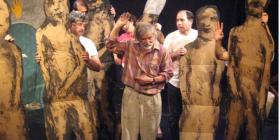Shashat: Cinema, women and social change

The latest recognition came in June 2015 by the Euro-Mediterranean Women’s Foundation and its EU funded project CSO WINS, an acronym for “Capacity-building in the Southern Mediterranean to Open policy dialogue and monitoring for Women IN Society”, aimed at selecting best practices to promote gender equality. According to the Foundation, Shashat Women Cinema’s approach to “Social change through women’s cinema” can be considered a model approach to be replicated in the Mediterranean region, where women’s creativity is becoming increasingly vital to the production of culture and the formation of complex layers of identities.
Shashat, meaning “screens” in Arabic, is about to celebrate its 10th anniversary. Founded in 2005 in Ramallah, Palestine, by a group of engaged women and men active in the fields of culture, academia and development, it was inspired by Alia Arasoughly, its current Director General, whose academic background focused on Arab women in cinema. Working as a media development professional for several international agencies, she noted how “media projects dedicated to women were sporadic, short termed, disconnected from each other, and therefore unable to bring about a transformation in the cultural production and in social attitude needed to affect the condition of women”, Arasoughly explains.
With Shashat instead, “the idea was to create a dedicated organisation whose mandate would be to offer alternative representations and stories of women by women filmmakers, to develop a new generation of Palestinian women filmmakers from areas outside the centre who can make films telling stories relevant to the experience of the majority of Palestinians, and to provide a framework for the national screenings and discussions of these films by communities in towns, villages, refugee camps and universities in the West Bank and the Gaza Strip”.
The approach developed by Shashat, and recognized by an Award for “Excellence in Cinema” by the Palestinian Ministry for Culture in 2010 and the nomination of Arasoughly as an outstanding “Woman Cultural Leader” in 2013, combines training and mentoring of young women filmmakers, providing them with a production portfolio, dissemination and discussion of films among youth and grassroots communities, and audience development through monitoring and evaluation “to learn from what we are doing and improve our methodology”, explains Arasoughly, or Dr. Alia, as the young filmmakers who participate in Shashat’s courses prefer to call her.
Since the beginning, the organization developed strong partnerships through an extensive informal network of 7 universities, 7 refugee camps and over 25 community and cultural organizations involved in the Women’s Film Festival tour that Shashat organises every year “except in 2014, given the war in Gaza”, Arasoughly remarks with a sad tone, “as nearly half of our filmmakers are from Gaza, and half of the festival tour takes place there”.
Shashat targeted youth as its primary audience and was the first cultural organisation to make use of the “activity period” allocated at Palestinian universities for student activities: in 2006 the annual Women’s Film Festival began touring 9 universities, including Arab-American University in Jenin, Al-Najah National University in Nablus, Birzeit University, Palestine Technical College, Al-Tireh Women Training College, Al-Quds University, Bethlem university, Hebron University all in the West Bank, and Al-Aqsa University in Gaza.
“The success of this initiative was beyond expectation, with 200 to 300 students participating in each screening and engaging in robust and vibrant discussions”, recalls Arasoughly. Audience surveys and evaluation reports throughout the years distinctly show the power of films to increase sensitization to women’s condition, as well as the “pleasure of engaging in open and stimulating discussions with others”.
The collaboration with these universities also helped in the selection of the young women filmmakers involved in Shashat’s training programs. “Girls who graduated from media and TV programs usually did not have experience in directing, i.e. developing a concept and a treatment, selecting a visual style of camera angles or sound design, and deciding on editing structure and rhythm”, explains Arasoughly, “as they worked mainly in coordination of productions roles. Shashat’s courses, instead, focus on giving the women filmmakers all the skills they need to be the decision-makers in their films”.
“For emerging filmmakers, getting support at the very beginning is the trickiest part”, comments Laila Abbas, author of Five cups & a cup, produced with the support of Shashat. “Finding people that believe in you and your vision when you have no big credits, or even no credits at all, is quite rare. That is where Shashat comes in”.
Each course revolves around a specific theme, from Confession in 2007 to Jerusalem so near, so far in 2008, Palestinian Summer in 2010, I am a woman in 2011 and 2012. “These are open calls, with headlines chosen just to inspire, as self expression is the most important for Shashat”, clarifies Arasoughly. A total of 76 films have been produced so far in the West Bank and Gaza including documentary, fiction and animation, available on Shashat’s Vimeo channel as well as on the website of its distributor, Tetraktys Films, with a few available on Shashat’s Youtube channel.
Screening of these films in universities and with over 100 community organizations “had a tremendous impact, with heated audience debates on the subjects of the films and people engaged in discussions long after the discussion was over”, recalls Dr. Alia. “In the beginning Shashat was criticized for its daring topics and its emphasis on social issues instead of political ones, but eventually it was recognized that the stories told by the young women filmmakers not only appealed to the public, but were a call to Palestinians to look closely at themselves and their society, this in addition to bringing fresh and new talents to Palestinian film production”.
The Women’s Film Festival’s 2-to-3-month national tours and the satellite TV broadcasting of some of the films and their discussions in both the West Bank and the Gaza Strip, as well as Shashat’s year-long “Films for Everyone” program, have provided women’s cinema to national Palestinian audiences irrespective of geographic, economic, and sectarian barriers, all the more noteworthy given the difficulties of mobility in Palestine and lack of film distribution channels.
The Women’s Film Festival is the first screening platform for the films directed by the young filmmakers who partake in Shashat’s training courses, but Shashat’s mentoring also includes dissemination of their films to International film festivals and assistance with production and fundraising for their new independent projects. As Omaima Hamouri, author of the successful short film White dress, who had been involved in Shashat’s activities for 3 years, simply puts it, “this is an unforgettable experience that will change your life forever. Especially why Shashat won’t ever leave you!”
Content produced in collaboration with Babelmed







